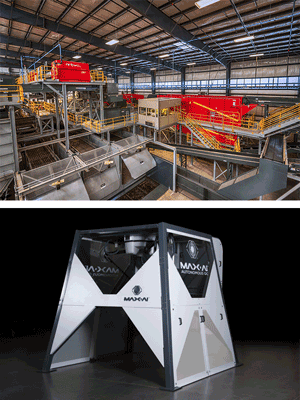Penn Waste chooses BHS for MRF upgrades
Penn Waste chooses BHS for MRF upgrades
< Eugene, Oregon-based Bulk Handling Systems (BHS) designed, engineered, manufactured and installed the processing line in 2015 and will provide the $3.5 million retrofit. Expected to be operational in August 2017, the upgraded system is designed to increase throughput to more than 45 tph and improve material purity.
Eugene, Oregon-based Bulk Handling Systems (BHS) designed, engineered, manufactured and installed the processing line in 2015 and will provide the $3.5 million retrofit. Expected to be operational in August 2017, the upgraded system is designed to increase throughput to more than 45 tph and improve material purity.
As part of the planned retrofit, Penn Waste is among the first to invest in Max-AI technology designed to improve container line performance. The Max-AI Autonomous QC (AQC) unit follows a new NRT SpydIR optical sorter targeting polyethylene terephthalate (PET) plastics. Max-AI technology uses artificial intelligence to identify non-PET items for the AQC to pick and return to the container line’s onset. In addition to the Max-AI AQC, Penn Waste is adding three new NRT optical sorters and an NRT MetalDirector. It also just recently added a Nihot SDS 800-i to clean larger volumes of glass.
The new container line will feature optical detection and recovery of 3-D fiber, such as small packing from online purchases. The company also added an optical sorter on its “last chance” residue line to remove containers and metals. The optical sorters will also enable the automated separation of additional commodities, including polypropylene (PP), colored and natural high-density polyethylene (HDPE).
According to Penn Waste, the retrofit is a response to the system’s success and the company’s ever-growing and changing material stream.
“Since our grand opening two years ago, we’ve seen a shift in our material, most notably a sizeable increase in our container volume,” says Scott Wagner, Penn Waste owner. “The new technology, operated by our exceptional staff, will enable us to stay ahead of our competition, producing the first-class commodities that our customers are accustomed to receiving from Penn Waste. We’re an early adopter, embracing the best available technology to maximize our recovery and product quality,” Wagner concluded.
Penn Waste Single Stream System
]]>
Source: Recycling Today
Penn Waste chooses BHS for MRF upgrades
<
